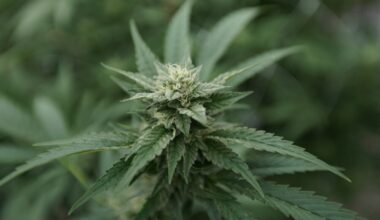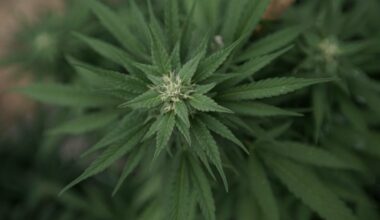A campaign chaired by a former Arkansas lawmaker has filed a constitutional amendment to put marijuana legalization on the state’s 2022 ballot—and it’s facing pushback from advocates who are working on two separate reform initiatives.
Eddie Armstrong, a Democrat who previously served as minority leader in the state House of Representatives before leaving office in 2019, first unveiled the plan to pursue legalization through the ballot late last year. Now that Armstrong’s group Responsible Growth Arkansas has formally filed the measure, its details are available.
The Arkansas Adult Use Cannabis Amendment would allow adults 21 and older to purchase and possess up to one ounce of marijuana. Existing medical cannabis dispensaries would be permitted to sell in the recreational market starting March 8, 2023, giving them an advantage.
Under the proposal, the Alcoholic Beverage Control Board (ABC) would be responsible for regulating the market and issuing marijuana business licenses. There would be a two-tiered approach to cultivator licensing, with the first tier being reserved for eight existing dispensaries and the second tier going to 12 other applicants through a lottery system.
The measure would also repeal and replace certain provisions of the state’s medical marijuana law, which was approved by voters at the ballot in 2016. Language would be updated for rules on advertising, packaging, labeling and purchase limits.
Advocates who are collecting signatures for separate legalization ballot measures have raised concerns that the Responsible Growth Arkansas proposal would deliberately benefit a select number of businesses, including those that have financially backed it, and stamp out competition.
The five donors who contributed $350,000 each to the campaign—Bold Team, Good Day Farms Arkansas, Osage Creek Cultivation, DMCC and NSMC-OPCO—are all existing cultivators, The Northwest Arkansas Democrat-Gazette reported.
Armstrong argued that his proposal is a “more responsible and regulated approach to expanding into this adult cannabis space for Arkansas,” and the campaign “took a look at how this could be done in a meaningful and well-regulated way for Arkansans.”
A 10 percent supplemental sales tax would be imposed on retail marijuana sales. Revenue would be used for law enforcement funding (15 percent), the University of Arkansas (10 percent), drug court programs (five percent), and the remainder would go to the state general fund after covering administrative costs.
Another issue with the new initiative for advocates is the lack of equity provisions. The measure does not provide a pathway for expungements, nor does it give licensing priorities to communities disproportionately impacted under prohibition.
There are two other campaigns that have already laid the groundwork to put cannabis legalization on the ballot this year. And both of those included equity components in their measures.
Arkansans for Marijuana Reform submitted the proposed constitutional amendment to the secretary of state’s office last year. It would allow adults 21 and older to possess up to four ounces of cannabis flower, two ounces of concentrates and cultivate up to six mature marijuana plants and six seedlings for personal use.
Under the group’s proposal, the state Department of Finance and Administration would be responsible for regulating the program and issuing cannabis business licenses. They would have to issue at least one retail license per 15,000 residents. No individual or entity could possess more than one cultivation and one dispensary license.
Mellisa Fults of Arkansans for Marijuana Reform slammed the new measure from Armstrong’s group, saying “its’ going to be a horrible monopoly.”
“It’s going to be awful for the state,” she told the Democrat-Gazette. “There’s no expungement of records, so they’re going to be making millions upon millions of dollars when there’s people who still have a felony on their record for a joint.”
In contrast, under Fults’s measure, courts would be obligated to provide relief to people with past convictions for possession or sales of up to 16 ounces of cannabis or six plants. However, they would have some discretion as to whether relief constitutes release from incarceration, expungements of past records and/or the restoration of voting rights.
A separate group of activists with Arkansas True Grass is already in the signature gathering process for a 2022 ballot initiative that would create a system of regulated sales for adults 21 and older, allowing them to purchase up to four ounces of cannabis and grow up to 12 plants for personal use.
True Grass spokesperson Jesse Raphael called the new measure from Responsible Growth Arkansas “a power grab by the medical monopoly.”
“It locks in all of the production for the recreational marijuana for the current producers of medical marijuana,” he said.
Both True Grass and Arkansans for Marijuana Reform attempted to place marijuana legalization initiatives on the 2020 ballot, but both campaigns were derailed by the coronavirus pandemic and failed to collect enough signatures by the deadline.
That’s despite a federal judge’s ruling in May 2020 that the secretary of state needed accept signatures that were not collected in-person or notarized due to the excess burdens that arose during the health crisis.
Read the text of the latest medical cannabis legalization ballot initiative below:
South Carolina Senate Begins Long-Anticipated Medical Marijuana Debate
Photo courtesy of Brian Shamblen.
Medical Disclaimer:
The information provided in these blog posts is intended for general informational and educational purposes only. It is not a substitute for professional medical advice, diagnosis, or treatment. Always seek the advice of your physician or other qualified healthcare provider with any questions you may have regarding a medical condition. The use of any information provided in these blog posts is solely at your own risk. The authors and the website do not recommend or endorse any specific products, treatments, or procedures mentioned. Reliance on any information in these blog posts is solely at your own discretion.







